Introduction
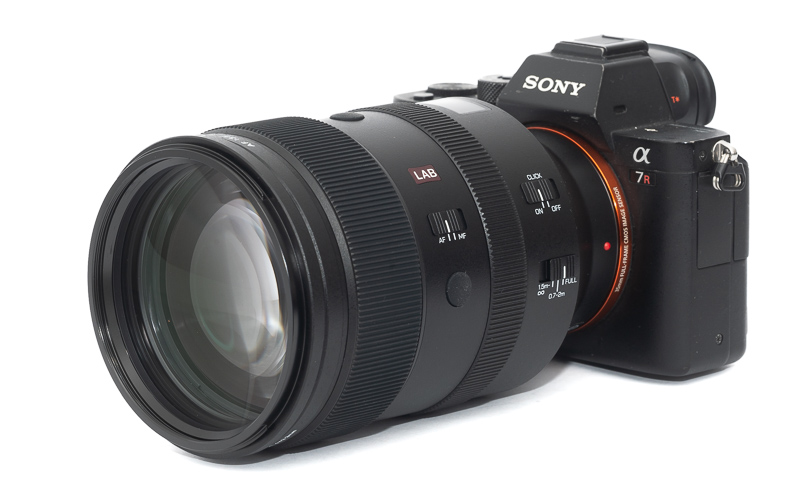 Viltrox 135mm 1.8 LAB AF on Sony A7rII
Viltrox 135mm 1.8 LAB AF on Sony A7rIIIn 2023 Viltrox started dipping its toes into the higher end lens market with the releases of their Viltrox AF 16mm 1.8 FE for fullframe as well as the Viltrox AF 75mm 1.2 Pro for APS-C cameras. Both lenses with great performance at a fair price point. Now at the end of 2024 we are getting this Viltrox AF 135mm 1.8 FE LAB, their most expensive lens so far. Let’s find out how it compares to the strong competition in this review!
Sample Images
 Sony A7III | Viltrox 135mm 1.8 LAB | f/2.0
Sony A7III | Viltrox 135mm 1.8 LAB | f/2.0 Sony A7III | Viltrox 135mm 1.8 LAB | f/2.0
Sony A7III | Viltrox 135mm 1.8 LAB | f/2.0 Sony A7III | Viltrox 135mm 1.8 LAB | f/1.8 | pano from 4 shots | polarizer
Sony A7III | Viltrox 135mm 1.8 LAB | f/1.8 | pano from 4 shots | polarizer Sony A7III | Viltrox 135mm 1.8 LAB | f/1.8
Sony A7III | Viltrox 135mm 1.8 LAB | f/1.8 Sony A7III | Viltrox 135mm 1.8 LAB | f/2.0
Sony A7III | Viltrox 135mm 1.8 LAB | f/2.0 Sony A7III | Viltrox 135mm 1.8 LAB | f/1.8
Sony A7III | Viltrox 135mm 1.8 LAB | f/1.8You can find many of the sample images in full resolution here.
Specifications
This Viltrox AF 135mm 1.8 FE LAB has the following specifications:
buy from manufacturer’s shop | Pergear | Amazon.com | Amazon.de | ebay.com | ebay.de | B&H (affiliate links) for $899
Disclosure
The Viltrox 135mm 1.8 AF LAB FE was kindly provided free of charge by Viltrox for reviewing purpose for a few weeks prior to release.
Handling/Build quality
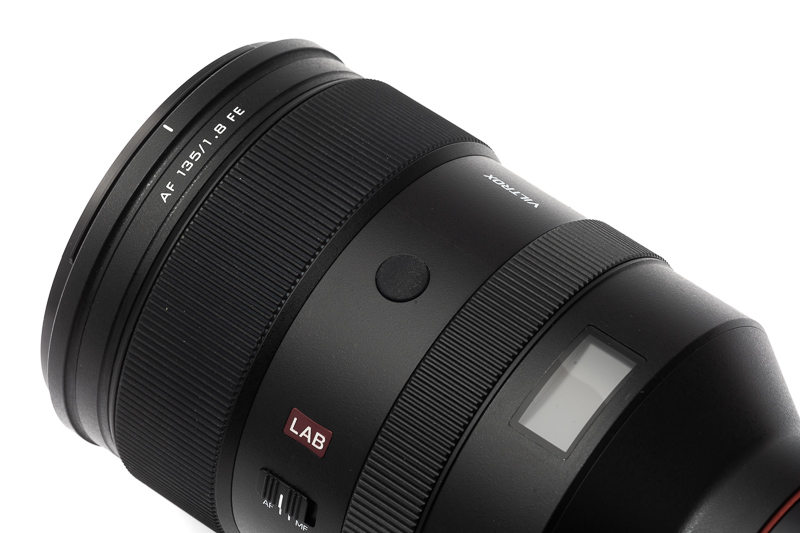 Viltrox 135mm 1.8 LAB AF
Viltrox 135mm 1.8 LAB AFThe Viltrox 135mm 1.8 LAB features a similar build quality as the Viltrox 16mm 1.8, but in my opinion there have been some unfortunate changes.
While the Viltrox 16mm 1.8 featured an aperture ring very similar to the Sony G/GM lenses, this one has no markings, it relies on the OLED display to show the current f/Stop.
Viltrox 135mm 1.8 LAB OLED display
Sadly that implementation leaves some to be desired. First it isn’t possible anymore to directly set the desired value, second the f/Stop displayed in the center is not always the chosen one, the marker also moves, which makes no sense to me at all. As you can see from these pictures it is also somewhat hard to hit the actual stops, so I ended up using the camera to change the aperture setting – something I never felt the need to do with the Viltrox FE 16mm 1.8 AF.
 customizable welcome screen
customizable welcome screenThere is also a smartphone app available that let’s you update the firmware (you need to hook the lens up to a USB-C charger or a strong powerbank) and also make some other adjustments, including setting a custom text or even one of your own pictures as welcome screen.
The aperture ring can be declicked and we have an AF/MF switch, a focus limiter with three different settings as well as two lens buttons.
The outer casing seems to be made from a high quality polycarbonate and all markings on the lens barrel are engraved and filled with paint.
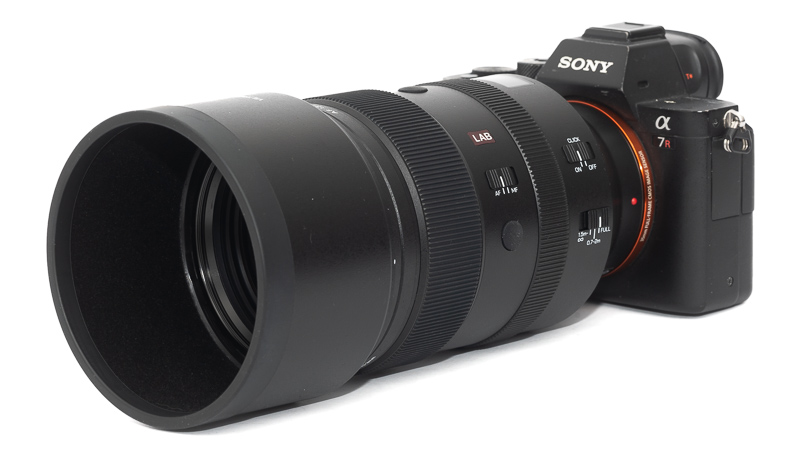 Viltrox 135mm 1.8 LAB AF with hood attached on Sony A7rII
Viltrox 135mm 1.8 LAB AF with hood attached on Sony A7rIIA bayonet style lens hood is also included. It features a rubber bumper at the front and felt on the inside. It snaps very tightly in place and can be mounted reversed for transport.
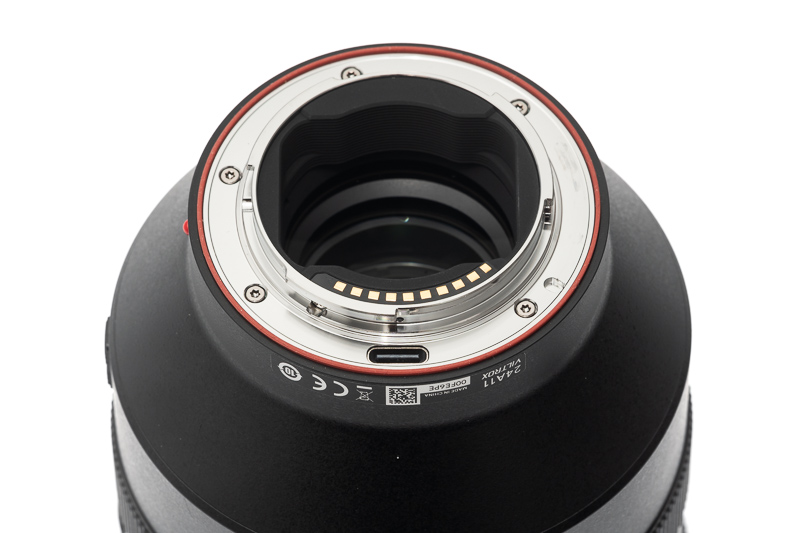 bayonet with USB-C socket
bayonet with USB-C socketAs is typical for Viltrox’ AF lenses you can find a USB-C socket at the bayonet. There is also a rubber gasket located here.
Considering the weight of this lens a removable tripod collar would have been a useful addition.
 Viltrox 135mm 1.8 LAB AF | Sigma 105mm 1.4 Art | Sony FE 85mm 1.4 GM
Viltrox 135mm 1.8 LAB AF | Sigma 105mm 1.4 Art | Sony FE 85mm 1.4 GMThe Viltrox 135mm 1.8 LAB is neither a small nor a lightweight lens. It is of similar size and weight as the bulky Sigma 105mm 1.4 Art and noticeably bigger than e.g. the Sony FE 85mm 1.4 GM. It should be noted here, than the Sony FE 135mm 1.8 GM is about 300g lighter whereas the Samyang 135mm 1.8 AF is more than 500g lighter.
 Viltrox 135mm 1.8 LAB AF via Megadap ETZ21 on Nikon Zf
Viltrox 135mm 1.8 LAB AF via Megadap ETZ21 on Nikon ZfI tried this lens with the Megadap ETZ21 adapter on a Nikon Z camera and neither AF nor Exif worked. I could not even attach the Neewer ETZ adapter to this lens.
AF performance
I am not shooting sports or fast moving animals/humans so if you want to know if the lens is fast enough for this, or how it compares to other lenses in this segment, you may have to look for a different review with a more detailed assessment of this aspect.
Generally the AF worked well, but it neither felt as fast nor as reliable as that of the latest first party lenses. There has since been a firmware update that might have further improved the AF performance.
Vignetting
light falloff
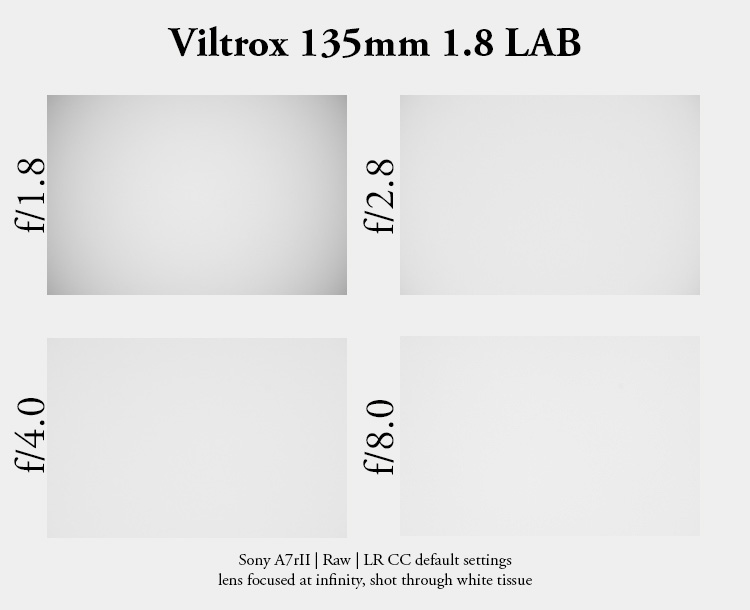
| f/1.8 | 1.6 EV |
| f/2.8 | 0.7 EV |
| f/4.0 | 0.3 EV |
| f/5.6 | 0.2 EV |
| f/8.0 | 0.2 EV |
| f/11- f/16 | 0.1 EV |
The vignetting figures are very typical for a fast 135mm lens. At shared apertures they are pretty much the same as those of the Sony FE 135mm 1.8 GM or the Canon EF 135mm 2.0L USM.
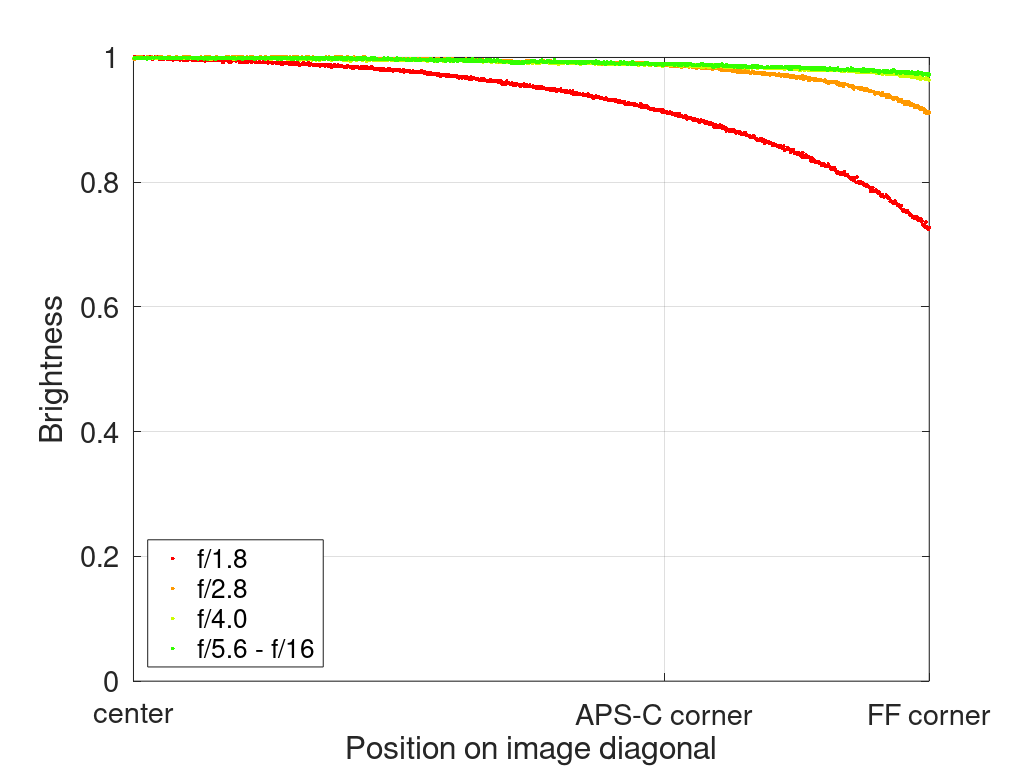 Viltrox 135mm 1.8 LAB
Viltrox 135mm 1.8 LABIt is recommended to have a look at this article first to get an idea how this brightness graph works.
optical vignetting
Fast lenses usually show a noticeable amount of optical vignetting. Without going too much into technical details optical vignetting leads to the truncation of light circles towards the borders of the frame.
In the center of the frame almost every lens will render a perfect circle, but only lenses with very low optical vignetting will keep this shape in the corners.
So in the following comparison we move from the center (left) to the extreme corner (right) and see how the shape of the light circle changes.
optical vignetting
In this category, the Viltrox 135mm 1.8 LAB compares favourably to most of the competition. The optical vignetting is on the same level as that of the Sigma 105mm 1.4 Art and the Sony FE 85mm 1.4 GM – some of the best lenses I came across in this category so far – and noticeably better than what I have seen from the Sony FE 135mm 1.8 GM and also the Canon EF 135mm 2.0L USM. This also makes it a very good choice for Brenizer/Bokehpanoramas.
The only 135mm 1.8 lens that probably shows even less optical vignetting is the Nikon Z 135mm 1.8 S Plena, which has been specifically designed to yield very low optical vignetting.
Unlike many of the competitors this lens does not make use of aspherical elements, so there are no onion ring structures to be found here.
Sharpness
MTF-Graphs
According to these graphs, at infinity we should expect very good performance at f/1.8 with only a small drop in resolution in the corners and absolutely impeccable performance stopped down.

Most MTF-Graphs show calculated values that do not take into account manufacturing tolerances and sample variation. Furthermore they are usually calculated for infinity, so in the field and shooting at different distances a noticeable variation may be visible.
Focus Shift
Sony A7rII | Viltrox 135mm 1.8 LAB | 33% crops
I do not see any field relevant focus shift here.
infinity (42mp Sony A7rII)
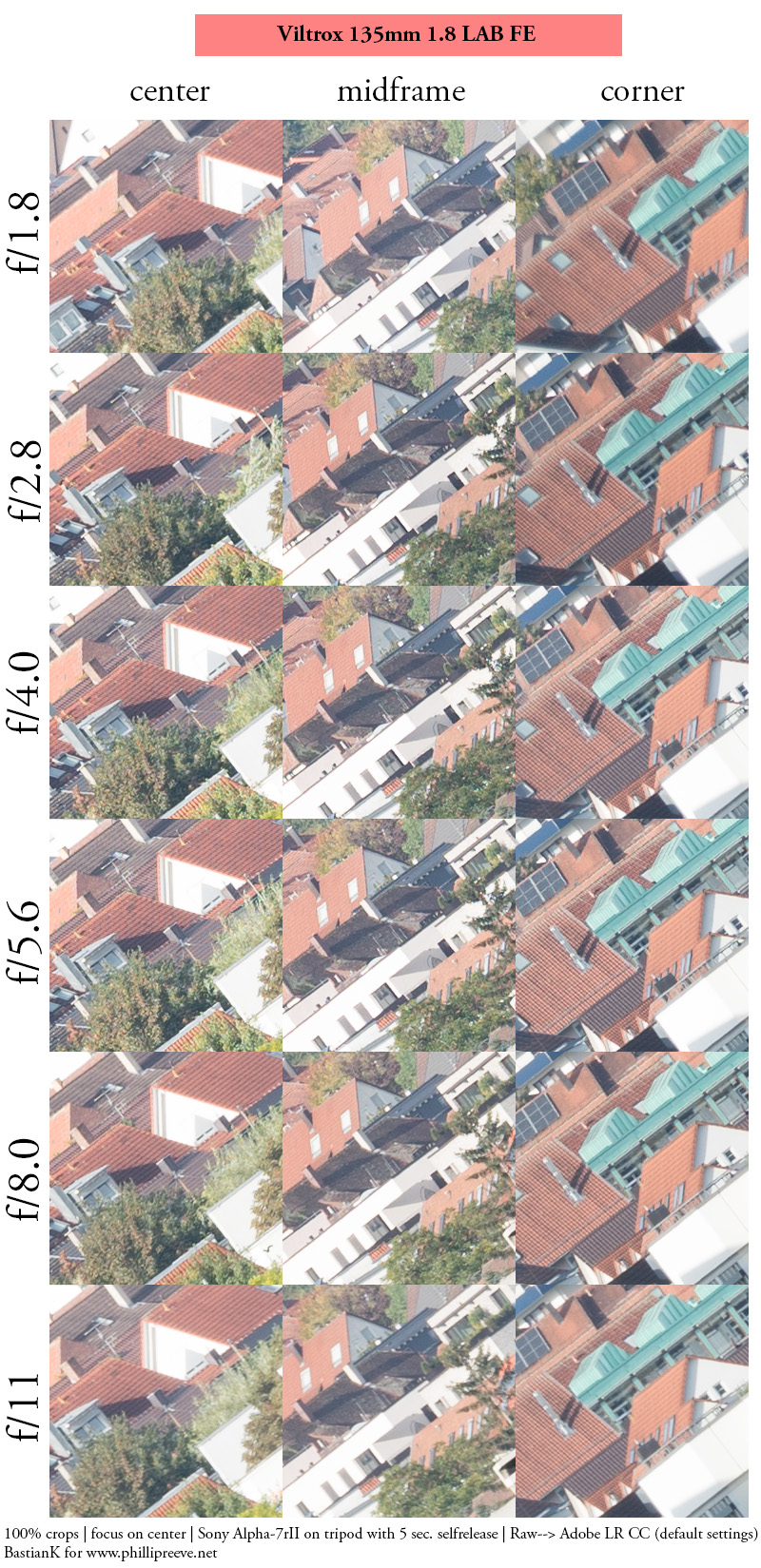
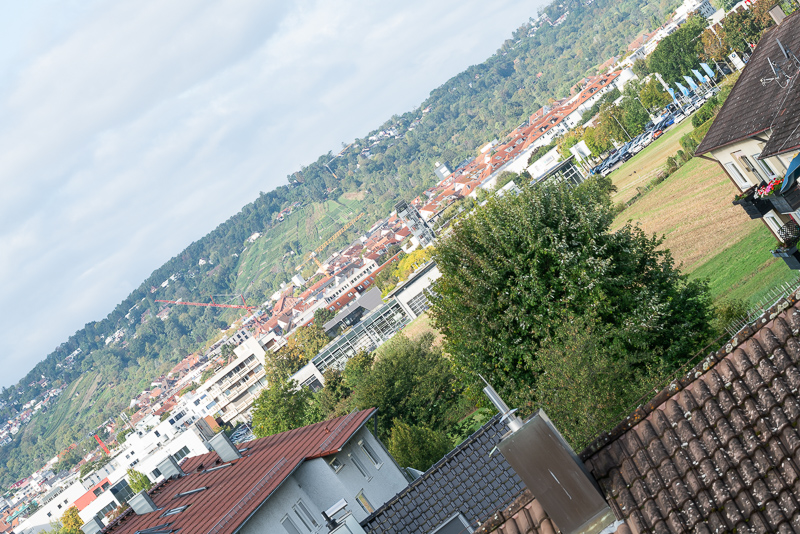 Sony A7rII | Viltrox 135mm 1.8 LAB | f/11
Sony A7rII | Viltrox 135mm 1.8 LAB | f/11A very good performance that does seem to comply with the MTF graphs. The corners do benefit from stopping down a stop, center and midframe already look great from f/1.8.
Putting things into perspective, most fast 135mm lenses do really well in this category, the Sony FE 135mm 1.8 GM as well as the Canon EF 135mm 2.0L USM actually show more impressive corners at their maximum aperture.
portrait distance (3.0 m, 42mp Sony A7rII)
For portraiture it isn’t so important how flat the field is, it is more interesting to see what the sharpness is like when focused at different parts of the frame to take field curvature out of the equation.
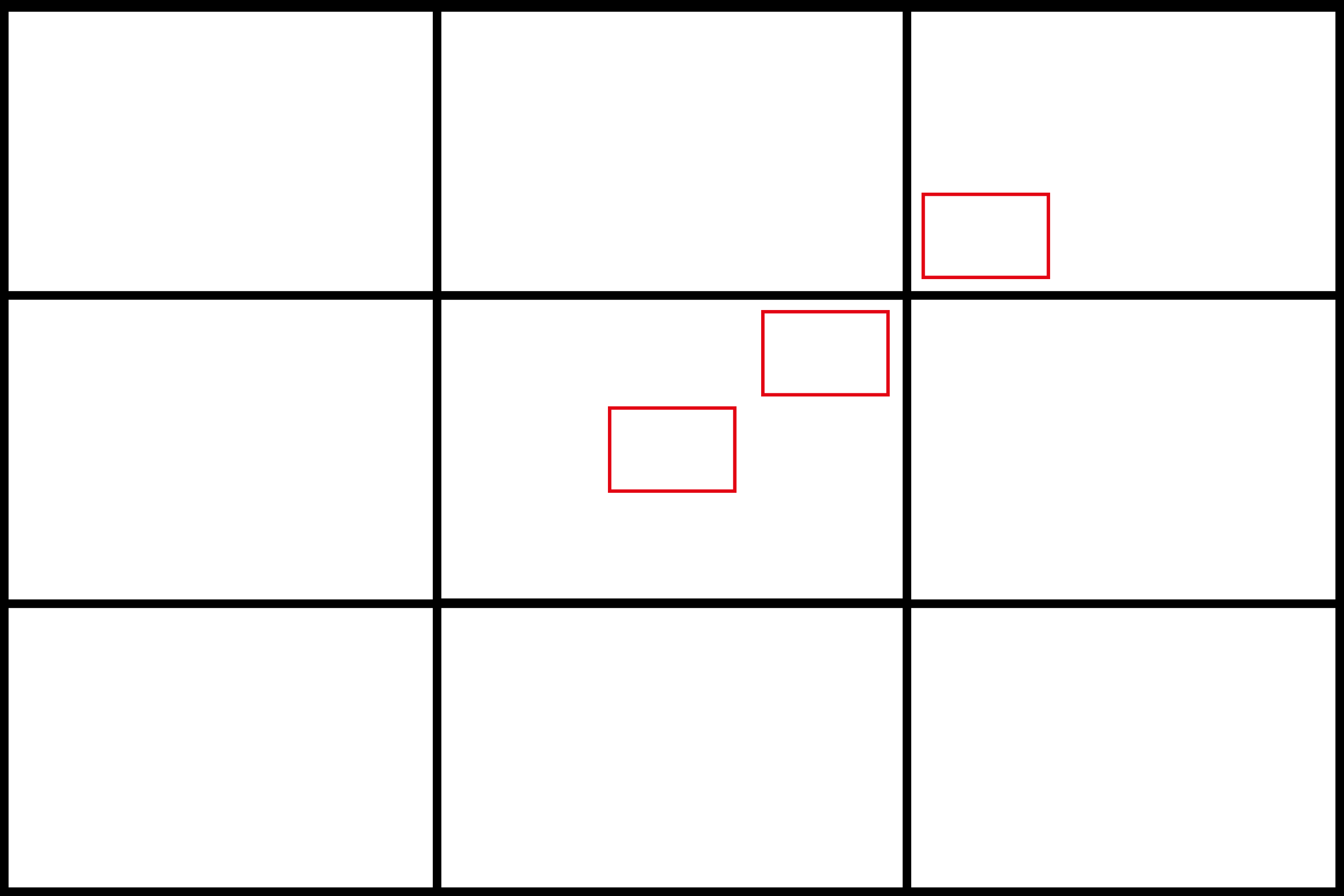 positions of crops in the frame
positions of crops in the frameThis is what I did here, I refocused for every shot and aperture to get the best possible result at different locations in the frame (center, inner midframe and outer midframe).
Focus distance was roughly 2.5 m and the circle of the dollar bill is more or less the size of a human eye.
f/1.8 <————> f/2.8
Sony A7rII | Viltrox 135mm 1.8 LAB | 100% crops
Also here we see a good performance that hardly leaves something to be desired for portrait applications, that being said lenses like e.g. the Sigma 105mm 1.4 Art (same entrance pupil, similar size/weight, harder to design) have shown an even more impressive performance here.
close (0.8 m, 1:4.0, 42mp Sony A7rII)
Sony A7rII | Viltrox 135mm 1.8 LAB | 100% crops from center
A maximum magnification of 1:4 is surely nice to have, as it allows for near macro shots. Performance is also good at these close distances with only a slight softness at the maximum aperture.
Also here it has to be mentioned that most of today’s fast 135mm lenses offer similarly high magnifications.
Flare resistance
As always evaluating flare is a complex matter since you can get any lens to look bad if you push it hard enough and a slight change of scenario can affect results a lot.
Fast tele lenses haven’t been exactly great performers in this category and none of those I have used so far I would attest an actually good performance in this category, but what about this Viltrox lens?
Sony A7rII | Viltrox 135mm 1.8 LAB | f/11
Ghosting isn’t really a problem with these lenses. I had to stop down to f/11 to create some small artefacts.
 Sony A7III | Viltrox 135mm 1.8 LAB | f/1.8
Sony A7III | Viltrox 135mm 1.8 LAB | f/1.8Veiling flare is usually more of an issue with these longer lenses. And also here I encountered some situations with a loss of contrast.
Generally, this is one of the better performances I have seen from a fast tele lens. I am actually not sure I have seen better than this yet.
Coma
100% crops from extreme corner, focused on center, A7rII
As is somewhat typical for the fast 135mm lenses Coma is corrected really well.
Distortion
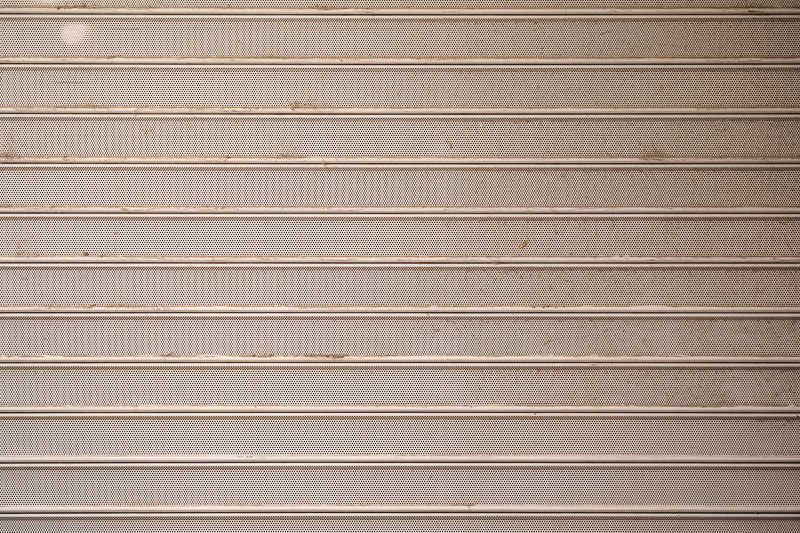 Sony A7III | Viltrox 135mm 1.8 LAB | f/1.8
Sony A7III | Viltrox 135mm 1.8 LAB | f/1.8The Viltrox 135mm 1.8 LAB only shows a negligible amount of distortion. I did not correct it in any of the sample pictures.
Bokeh
 Sony A7III | Viltrox 135mm 1.8 LAB | f/1.8
Sony A7III | Viltrox 135mm 1.8 LAB | f/1.8This is what we are all here for, isn’t it? Let’s have a closer look.
Close distance
 Sony A7III | Viltrox 135mm 1.8 LAB | f/1.8
Sony A7III | Viltrox 135mm 1.8 LAB | f/1.8 Sony A7III | Viltrox 135mm 1.8 LAB | f/1.8
Sony A7III | Viltrox 135mm 1.8 LAB | f/1.8 Sony A7III | Viltrox 135mm 1.8 LAB | f/1.8
Sony A7III | Viltrox 135mm 1.8 LAB | f/1.8 Sony A7III | Viltrox 135mm 1.8 LAB | f/1.8
Sony A7III | Viltrox 135mm 1.8 LAB | f/1.8Good news: optical vignetting is low, sharpness is good, bokeh is mostly smooth. With the sea gull picture we can see that even at close focus distances structured backgrounds can look a bit distracting though.
Medium distance
 Sony A7III | Viltrox 135mm 1.8 LAB | f/1.8
Sony A7III | Viltrox 135mm 1.8 LAB | f/1.8 Sony A7III | Viltrox 135mm 1.8 LAB | f/1.8
Sony A7III | Viltrox 135mm 1.8 LAB | f/1.8 Sony A7III | Viltrox 135mm 1.8 LAB | f/1.8
Sony A7III | Viltrox 135mm 1.8 LAB | f/1.8At mid distances the situation is very similar. The perceived subject isolation is good because of high sharpness and contrast in the focal plane, but structured out of focus backgrounds do not always look very pleasing.
Long distance
 Sony A7III | Viltrox 135mm 1.8 LAB | f/1.8
Sony A7III | Viltrox 135mm 1.8 LAB | f/1.8 Sony A7III | Viltrox 135mm 1.8 LAB | f/1.8
Sony A7III | Viltrox 135mm 1.8 LAB | f/1.8 Sony A7III | Viltrox 135mm 1.8 LAB | f/1.8
Sony A7III | Viltrox 135mm 1.8 LAB | f/1.8 Sony A7III | Viltrox 135mm 1.8 LAB | f/2.0
Sony A7III | Viltrox 135mm 1.8 LAB | f/2.0Long focus distances are actually where these longer lenses can shine, as they still allow for a decent amount of subject separation even with the main subject being farther away. I like the results I am getting at night with point light sources in the background, but I don’t like too much what it makes of more structured backgrounds during day hours.
Now personally, I prefer the slightly softer look of the old Canon EF 135mm 2.0L USM here and also the Sony FE 135mm 1.8 GM looks a bit better to me. I don’t have enough first hand experience with the Samyang AF 135mm 1.8 FE to tell you how they compare in detail, but I plan on changing that in the future.
Sunstars
Sony A7rII | Viltrox 135mm 1.8 LAB
Viltrox decided to go for 11 rounded aperture blades here, similar to the Sony GM lenses. Here the alignment of the blades isn’t as exact though, so the sunstars look a bit frayed and the rays show uneven lengths. However, I don’t think many people will be primarily using a 135mm 1.8 for blue hour architecture shooting, so that shouldn’t really be an issue.
If you want to learn more about this topic have a look at this article.
Chromatic aberration
lateral
I did not see any lateral CA that I could show you here.
longitudinal
Sony A7rII | Viltrox 135mm 1.8 LAB | f/1.8
Some good news here for those of you that don’t like to deal with any kind of bokeh or purple fringing: this lens is perfectly corrected. If there was an Apo tag on this lens, it would be well deserved.
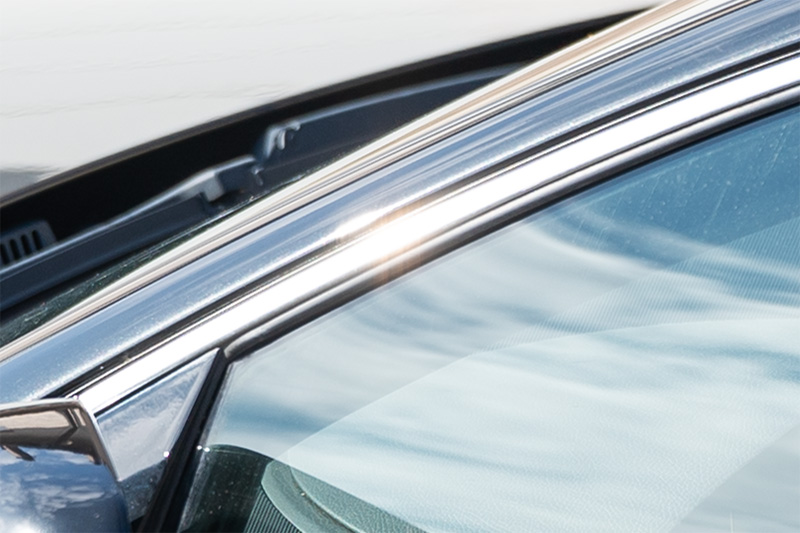 Sony A7rII | Viltrox 135mm 1.8 LAB | f/1.8 | 100% crop
Sony A7rII | Viltrox 135mm 1.8 LAB | f/1.8 | 100% cropThat being said, also many of the other fast 135mm do really well here and show a similar performance, e.g. the old manual focus Samyang 135mm 2.0, the Zeiss 135mm 2.0 Apo-Sonnar and also the Sony FE 135mm 1.8 GM.
Conclusion
good
|
average
|
not good
|
From the table above you can already easily see that we are dealing with a very good, well corrected modern AF lens here. Sharpness is good to very good under pretty much all circumstances, bokeh is nice with low optical vignetting, the correction of longitudinal CA is on Apo level and even flare resistance is surprisingly good for a fast tele lens. I also did not come across any outstanding flaw that would spoil the whole picture.
If Viltrox had asked me, what kind of a portrait lens to design, I would have not recommended going for fast 135mm lens. Why is that? Beause the competition (see next section) is extremely strong.
In the E-mount world for a little more money you can get a used copy of the Sony FE 135mm 1.8 GM, which performs better in several categories and offers outstanding AF. Then there is also the Samyang AF 135mm 1.8 FE. I haven’t reviewed that lens (yet), but according to everything I have seen so far it also looks like a compelling option and can often be found for less money. And those lenses are noticeably lighter on top of that.
At the end of the day, this Viltrox 135mm 1.8 LAB is a very good lens, but some of the competitors are even better. So I think it would have been a smarter move to design a true mirrorless 105mm 1.4 which isn’t as huge as the Sigma 105mm 1.4 Art or a 85mm 1.2 with AF which we also don’t have in the E-mount world yet.
buy from manufacturer’s shop | Pergear | Amazon.com | Amazon.de | ebay.com | ebay.de | B&H (affiliate links) for $899
Alternatives
All the modern 135mm 1.8 lenses are great, there is simply no dud among them. And even the last generation 135mm 2.0 lenses are great, you cannot really go wrong with any of these.
Nikon Z 135mm 1.8 S Plena:
Nikon came up with a name for this Z-mount lens, which they rarely do, and therefore means there must be something special about it and in this case it is the very low amount of optical vignetting. If that alone is worth the steep asking price is a very personal question though.
buy from amazon.com | amazon.de | ebay.com | ebay.de | B&H (affiliate links) for $2497
Sony FE 135mm 1.8 GM:
Sony’s own 135mm 1.8 is a nearly flawless lens. Sharpness and AF are top level and the bokeh actually looks a bit nicer to me compared to this Viltrox lens. You may find a used copy for not much more than the asking price of this Viltrox lens.
buy from amazon.com | amazon.de | ebay.com | ebay.de | B&H (affiliate links) for $1599
Samyang 135mm 1.8 AF:
I haven’t used this one personally yet. It is by far the lightest of the 135mm 1.8 mirrorless designs and also the cheapest. From everything I have seen so far it seems to be a compelling option as well. I need to get my hands on one for a more detailed comparison.
buy from amazon.com | amazon.de | ebay.com | ebay.de | B&H (affiliate links) for $799
Sigma 135mm 1.8 Art:
Sigma’s 135mm 1.8 is a lens still designed for DSLRs which makes it unnecessarily heavy and big compared to the aforementioned lenses. It is roughly the same size and weight as this Viltrox lens though. I would only consider it if I was still using DSLRs.
buy from amazon.com | amazon.de | ebay.com | ebay.de (affiliate links) starting at $800 (used)
Sample Images
 Sony A7III | Viltrox 135mm 1.8 LAB | f/1.8
Sony A7III | Viltrox 135mm 1.8 LAB | f/1.8 Sony A7III | Viltrox 135mm 1.8 LAB | f/1.8
Sony A7III | Viltrox 135mm 1.8 LAB | f/1.8 Sony A7III | Viltrox 135mm 1.8 LAB | f/2.0
Sony A7III | Viltrox 135mm 1.8 LAB | f/2.0 Sony A7III | Viltrox 135mm 1.8 LAB | f/1.8
Sony A7III | Viltrox 135mm 1.8 LAB | f/1.8 Sony A7III | Viltrox 135mm 1.8 LAB | f/1.8
Sony A7III | Viltrox 135mm 1.8 LAB | f/1.8 Sony A7III | Viltrox 135mm 1.8 LAB | f/2.0
Sony A7III | Viltrox 135mm 1.8 LAB | f/2.0 Sony A7III | Viltrox 135mm 1.8 LAB | f/1.8
Sony A7III | Viltrox 135mm 1.8 LAB | f/1.8 Sony A7III | Viltrox 135mm 1.8 LAB | f/1.8
Sony A7III | Viltrox 135mm 1.8 LAB | f/1.8 Sony A7III | Viltrox 135mm 1.8 LAB | f/1.8
Sony A7III | Viltrox 135mm 1.8 LAB | f/1.8You can find many of the sample images in full resolution here.
Further Reading
- Guide to 85-135mm Portrait lenses
- Review: Zhong Yi 135mm 1.4 Mitakon
- Review: Viltrox 75mm 1.2 AF E Pro (APS-C)
- Bokeh explained
- Reviewing Lenses isn’t really worth it
Support Us
Did you find this article useful or just liked reading it? Treat us to a coffee!
![]()
![]()
![]() via Paypal
via Paypal
This site contains affiliate links. If you make a purchase using any of the links marked as affiliate links, I may receive a small commission at no additional cost to you. This helps support the creation of future content.
The following two tabs change content below.
My name is Bastian and I am your expert here when it comes to ultra wide angle lenses, super fast portrait lenses (ranging from a 50mm f/0.95 to a 200mm f/1.8) and I also have reviewed way too many 35mm lenses. Don't ask me anything about macro or wildlife shooting though.

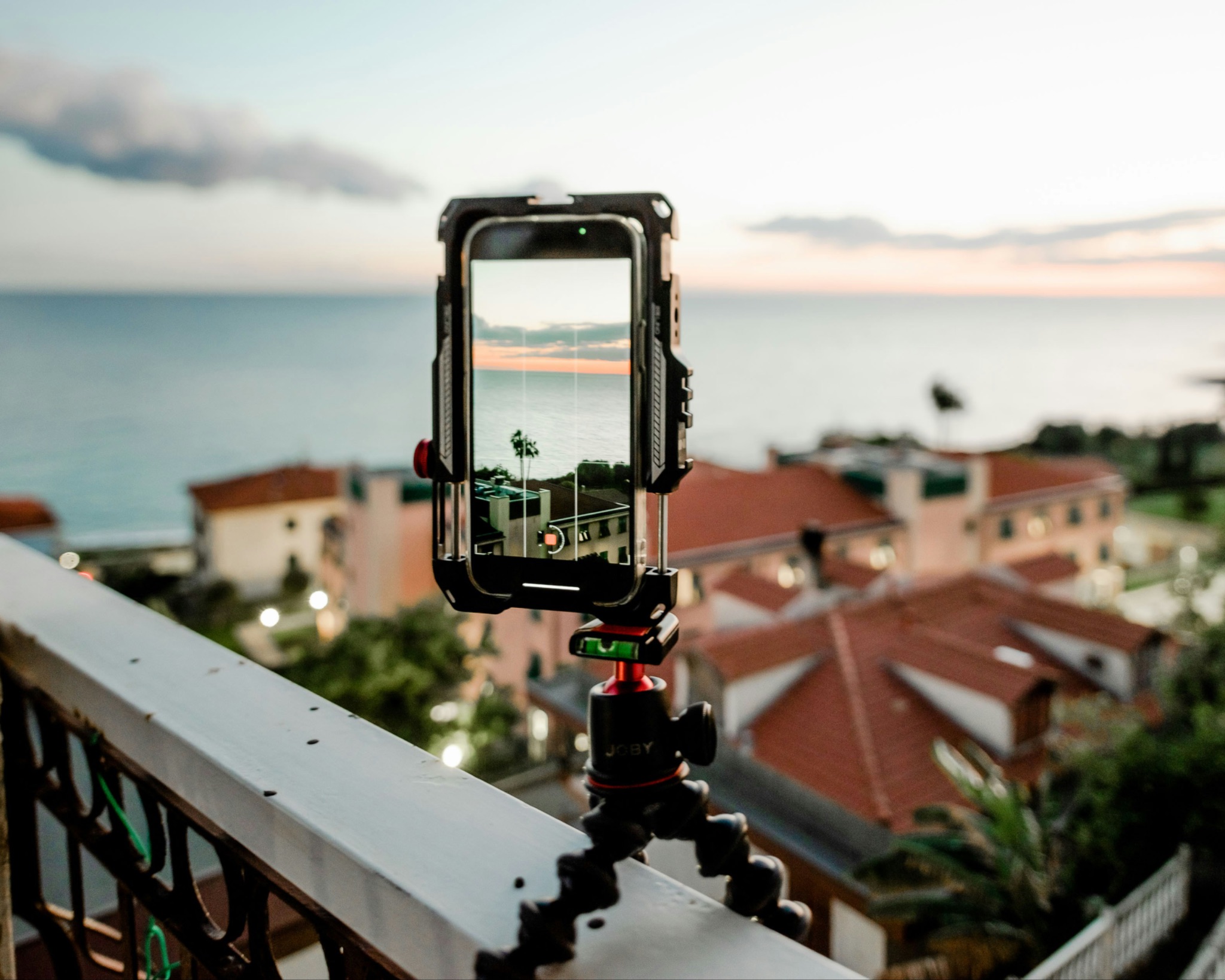


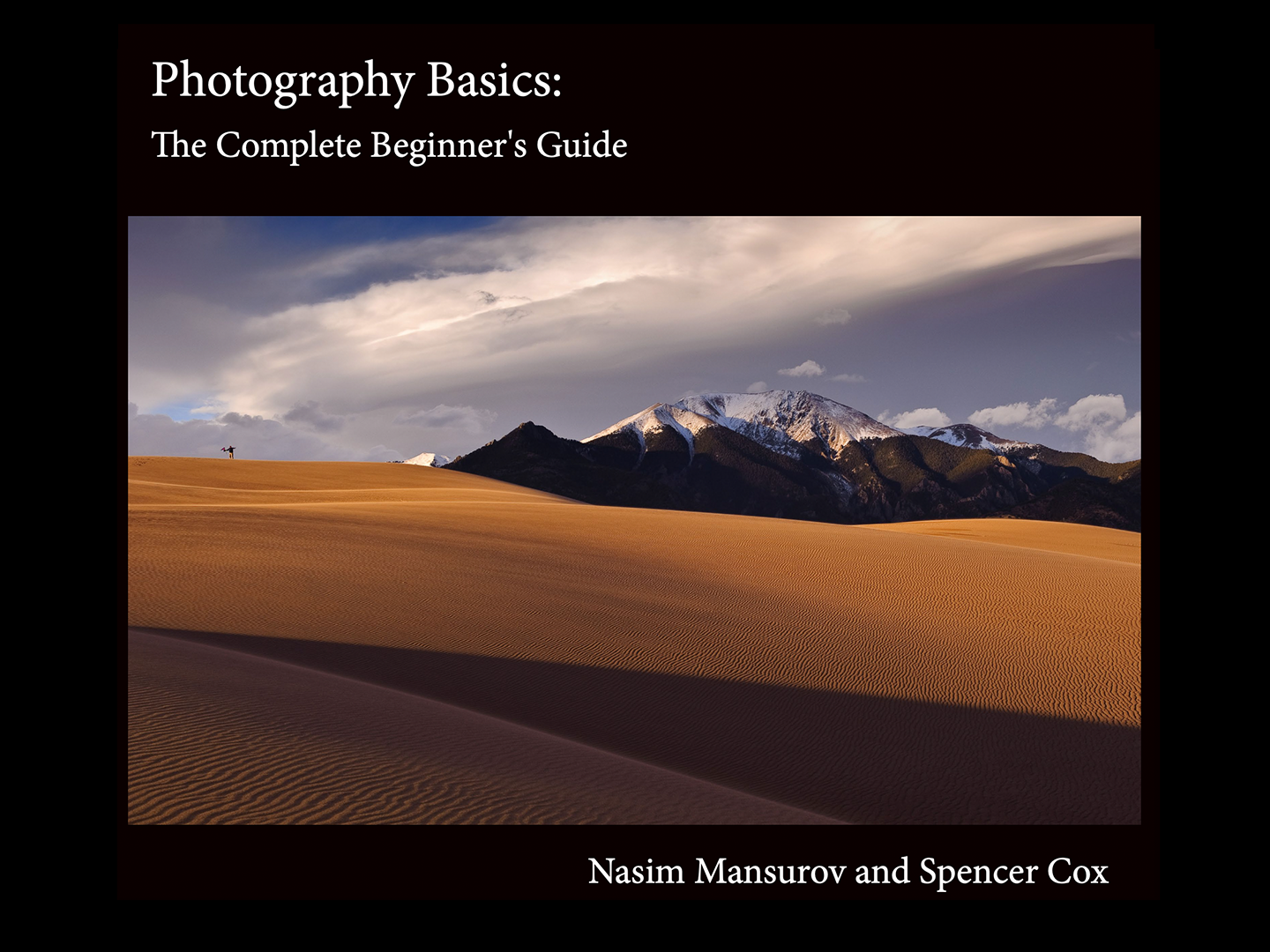

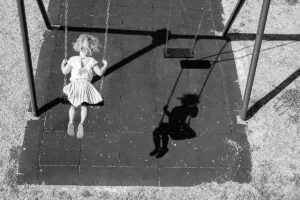



 English (US) ·
English (US) ·